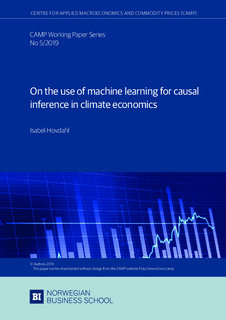| dc.contributor.author | Hovdahl, Isabel | |
| dc.date.accessioned | 2019-06-26T09:28:34Z | |
| dc.date.available | 2019-06-26T09:28:34Z | |
| dc.date.issued | 2019-06 | |
| dc.identifier.issn | 1892-2198 | |
| dc.identifier.uri | http://hdl.handle.net/11250/2602267 | |
| dc.description.abstract | One of the most important research questions in climate economics is the relationship between temperatures and human mortality. This paper develops a procedure that enables the use of machine learning for estimating the causal temperature-mortality relationship. The machine-learning model is compared to a traditional OLS model, and although both models are capturing the causal temperature-mortality relationship, they deliver very different predictions of the effect of climate change on mortality. These differences are mainly caused by different abilities regarding extrapolation and estimation of marginal effects. The procedure developed in this paper can find applications in other fields far beyond climate economics. | nb_NO |
| dc.language.iso | eng | nb_NO |
| dc.publisher | BI Norwegian Business School | nb_NO |
| dc.relation.ispartofseries | CAMP Working Paper Series Paper;05/2019 | |
| dc.subject | Climate change | nb_NO |
| dc.subject | machine learning | nb_NO |
| dc.subject | mortality | nb_NO |
| dc.title | On the use of machine learning for causal inference in climate economics | nb_NO |
| dc.type | Working paper | nb_NO |
| dc.source.pagenumber | 51 | nb_NO |
